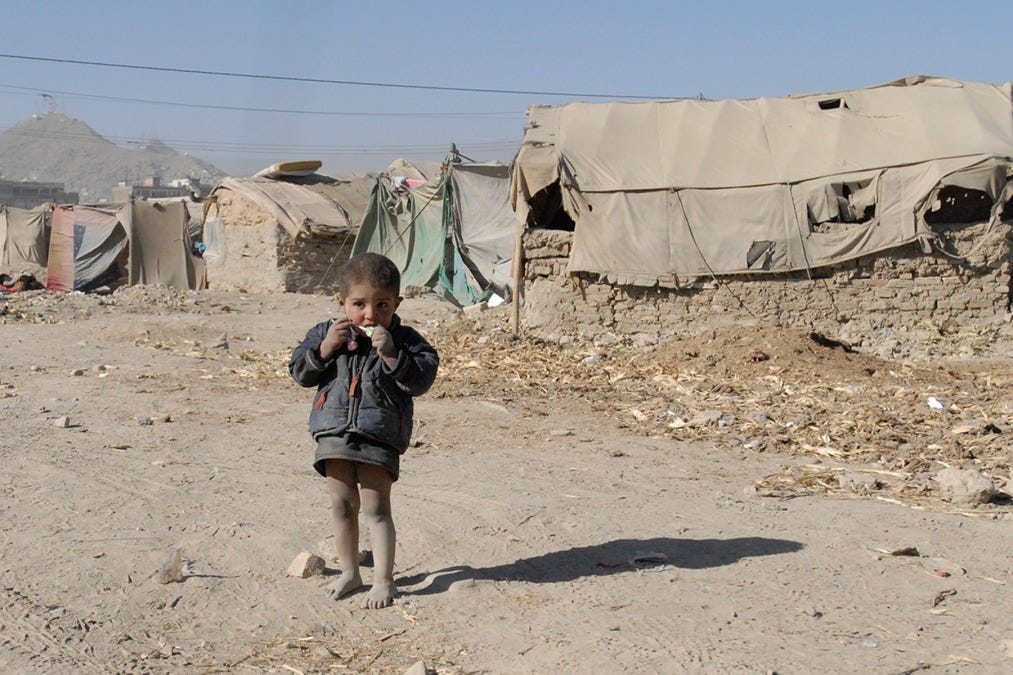Americans Have Been Duped Into Hating Afghanistan
A new poll shows a majority of Americans have accepted a morally indefensible position on a country we destroyed.
The average low temperature in Kabul, Afghanistan this time of year is 25 degrees Fahrenheit. Some nights it is colder than that, some it is warmer. Right now, it is midnight in Kabul and 29 degrees, though it could fall as low as 20 before the morning.
That isn't outside the norm for a major city in the U.S.; here in New York, it might get down to 14 tomorrow night after the snowstorm. But I live in an insulated apartment with built-in heaters. I make plenty of money to pay my electricity bill. There is food in my fridge. In Afghanistan, NPR reports that up to 98 percent of the population is currently being forced to decide between heating their homes and eating.
This is not a particularly shocking or revelatory comparison to make. Conditions in the U.S. are markedly better than conditions in a country the U.S. and many other countries have been periodically invading, bombing, or otherwise savaging for decades. But what is remarkable is that at some point, two decades of jingoism toward the Afghan people have led American voters into an indefensible moral position, one in which we will find ourselves guilty of mass murder all over again, this time through inaction and callous neglect.
A Morning Consult poll today found that "60 percent of American voters, including 47 percent of Democrats and 3 in 4 Republicans, oppose sending financial aid to mitigate Afghanistan’s multiple humanitarian crises because the money could end up with the Taliban."
This is indefensible. Even the context provided by Morning Consult -- by no means a left-leaning polling organization -- makes the situation look obscene:
The United Nations estimates half the Afghan population — roughly 22 million people — face acute hunger, with 1 million children at risk of malnutrition. Eight million people are at risk of starvation if aid does not arrive, according to U.N. spokesman Martin Griffins.
Some lawmakers in the House are pushing the Biden administration to unfreeze Afghanistan’s Central Bank reserves, which could release $9.4 billion, a figure nearly double what the United Nations has sought.
The broader question of sanctions is a hotly debated one in international circles, as they have long been viewed as a diplomatic tool of force that avoids physical violence. But if the end result of a broad sanction such as freezing the central reserves of a country is mass death of its civilians, what's the difference between that and a bomb?
We've done this before. The U.S.'s first foray against Saddam Hussein and Iraq was followed by a decade of intensified sanctions that decimated the country's economy—collapsing its health network, education systems, and food distribution—while entrenching Saddam's hold as a dictator. Ineffective, broad sanctions against Iran continue to lead that country's autocracy to pass the costs of diplomatic failure down as pain onto their own citizens, as a multi-pronged, U.S.-led campaign of persecution has intensified the coronavirus pandemic's death toll with little diplomatic gains to show for it.
The Taliban are a brutal, repressive, theocratic regime that has regularly used acts of terrorism on their own people and their political enemies. But they are also now the government of Afghanistan, and if we continue our economic war on the Taliban unabated, the people of Afghanistan will die. This will not, contrary to the international relations community's prevailing wisdom, be the Taliban's fault. It will be the fault of nations and bodies that kept aid and money and supplies from going to a country over the fear that it would prop up a regime that has already won.
The idea that allowing the government of Afghanistan access to the government of Afghanistan's funds would pose a security risk to the United States of America is, at this point, delusional. Americans are so blinded by the fear of a regime that never attacked the U.S. on its own soil and a stubborn refusal to admit that the War on Terror failed that we will doom a nation of human beings to freezing, starving death. There's no justification for it.
It is a crime that our leaders instilled this attitude in us, and a moral failing that we have not been able to see through it. And it is a sure sign that until we grapple with and fully accept the consequences of our long decades of war, a better world will not be possible in this country—and a far darker one will take hold in every country we have already ruined.



